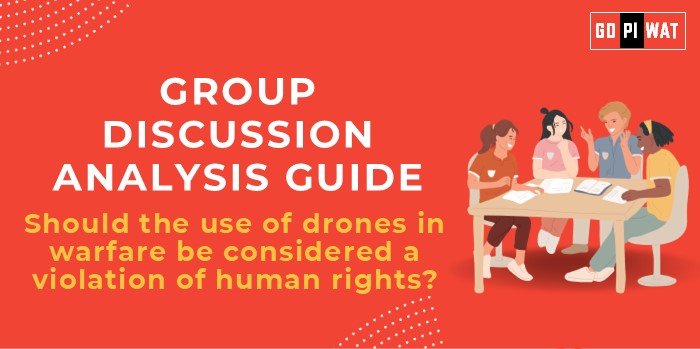📋 Group Discussion (GD) Analysis Guide
Should the use of drones in warfare be considered a violation of human rights?
🌐 Introduction
Opening Context: The use of drones in warfare has reshaped modern combat, introducing new ethical, legal, and societal questions. As nations rely increasingly on drones, discussions on their compatibility with human rights intensify.
Topic Background: Drones, or unmanned aerial vehicles (UAVs), are now integral to military operations globally. Initially employed for surveillance, their evolution into strike capabilities has sparked debates on civilian harm, accountability, and international law.
📊 Quick Facts and Key Statistics
- Drone Strikes: Over 10,000 strikes reported globally between 2010–2023, with significant civilian casualties (UNHRC).
- Cost Efficiency: Drones reduce operational costs by up to 90% compared to manned missions (RAND Corporation).
- Civilian Impact: Approximately 20–30% of drone strike casualties are non-combatants (Amnesty International).
- Military Usage: 100+ countries operate drones, with 35 possessing armed drones (Stockholm International Peace Research Institute).
👥 Stakeholders and Their Roles
- Governments: Utilize drones for counterterrorism and national defense, responsible for compliance with international law.
- Military Forces: Implement drone strategies; balance operational efficiency with ethical considerations.
- Citizens: Advocate for transparency and accountability in drone operations.
- NGOs/UN: Monitor human rights impacts, push for legal reforms.
🏆 Achievements and Challenges
Achievements
- Precision Targeting: Reduced collateral damage compared to traditional methods in select scenarios.
- Operational Safety: Minimizes risks to soldiers in combat zones.
- Cost-Effectiveness: Significant reduction in war expenditures.
- Successful Operations: Neutralization of key terror threats (e.g., Al Qaeda leaders).
Challenges
- Civilian Casualties: Persistent reports of misidentification leading to deaths.
- Legal Ambiguity: Lack of clear international drone warfare regulations.
- Ethical Concerns: Questions about remote decision-making and accountability.
Global Comparisons:
- USA: Extensive use in counterterrorism but under scrutiny for civilian harm.
- UK: Committed to ethical use but criticized for vague policies.
- China: Rapidly advancing drone technology with minimal regulatory oversight.
Case Study: Pakistan (2004–2015): Over 400 strikes reported, with significant backlash over civilian deaths.
🔎 Structured Arguments for Discussion
- Supporting Stance: “Drones enhance military precision and reduce human casualties among soldiers.”
- Opposing Stance: “Drone warfare disproportionately harms civilians and undermines international law.”
- Balanced Perspective: “While drones offer operational advantages, their use must adhere to strict ethical and legal frameworks to prevent rights violations.”
💬 Effective Discussion Approaches
- Opening Approaches:
- Statistical Opener: “20–30% of drone strike casualties are civilians. Can we justify this in the name of security?”
- Ethical Lens: “Is it ethical to kill remotely, without personal accountability?”
- Legal Framework: “The absence of clear international drone laws creates a dangerous precedent.”
- Counter-Argument Handling:
- Recognize operational benefits but propose stricter oversight.
- Emphasize case studies illustrating civilian harm.
- Advocate for balancing security needs with ethical norms.
📈 Strategic Analysis (SWOT)
- Strengths: Precision, cost-efficiency, soldier safety.
- Weaknesses: Civilian casualties, ethical dilemmas, lack of transparency.
- Opportunities: International collaboration on drone governance.
- Threats: Escalation of global conflicts, proliferation to non-state actors.
🌍 Connecting with B-School Applications
- Real-World Applications: Project themes on ethics in AI, governance models, and operational innovation.
- Sample Interview Questions:
- “What frameworks can ensure ethical use of drones in warfare?”
- “How can militaries balance operational goals with human rights?”
- Insights for B-School Students:
- The importance of ethical frameworks in technology adoption.
- Role of AI and automation in operational strategies.


